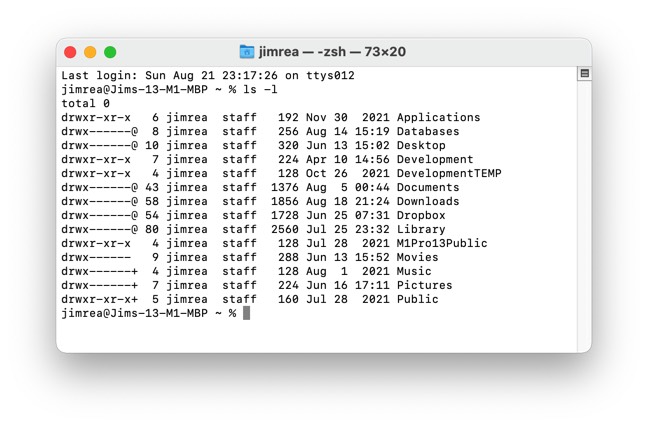The shellscriptwithterminal statement runs a shell script in a new Terminal.app window (useful for debugging).
Parameters
This statement has one parameter:script – shell script to run.
Description
This statement runs a shell script in a new Terminal.app window. This is similar to the shellscript statement, but instead of running the script invisibly, you can see the result in a Terminal.app window. For example, suppose you run the program:
shellscriptwithterminal {ls -l}
This will open a new window in Terminal.app and run the shell command ls -l, like this:

Panorama formulas can be embedded in the script using special tags. To embed a Panorama formula use
$«formula»$
The formulas are calculated in advance, then embedded into the source code as constants. For example, the formula $«2*3»$ will be embedded into the program as 6. The formula $«upper("hello world")»$ will be embedded as HELLO\ WORLD.
In the case of text formulas any special characters will be encoded as necessary for a proper shell script literal. For example the formula $«{"}»$ will be embedded as ".
To embed a Panorama formula with no quotes or translation use
^«formula»^
The shellscriptwithterminal statement only allows one line of shell script code, but you can run multiple shell script commands on a single line by separating each line with a semicolon. This example runs two commands - first it uses cd to switch to a different directory, then it runs a second command (in this case ls to list the directory contents).
let directory = "Desktop"
let command = "ls -l"
shellscriptwithterminal {cd $«directory»$;^«command»^}
See Also
- applescriptconstant( -- converts an expression into an AppleScript literal.
- applescriptstring( -- converts text into an AppleScript string literal.
- arraytopythonlist( -- converts a Panorama array into a Python list.
- hideotherapplications -- hides all other applications, leaving only Panorama visible.
- javascriptconstant( -- converts an expression into a JavaScript literal.
- javascriptstring( -- converts a text string into a JavaScript string
- jsonscriptstring( -- converts text into a JSON string literal
- loadcustomfunctions -- reloads all ProVUE defined custom functions.
- openanything -- opens a document or application.
- openurl -- opens a URL (usually a web page or to create an e-mail message).
- openurlinbackground -- opens a URL (usually a web page or to create an e-mail message) without bringing forward the app that handles the URL (in other words, Panorama remains the frontmost application).
- openwith -- opens a document with a specific application.
- openwithterminal -- opens an application in a new Terminal.app window (useful for debugging).
- perlconstant( -- encodes text for use as a constant in a Perl program.
- perlscriptstring( -- converts text into a Perl string literal.
- phpconstant( -- encodes text for use as a contant in a php program.
- posixpath( -- converts a path and filename into a POSIX path that can be used as a parameter to a shell command.
- pythonconstant( -- encodes text for use as a constant in a python program.
- registercustomfunction -- defines a new custom function.
- revealinfinder -- reveals a file or folder in the Finder.
- revealmultipleinfinder -- reveals one or more files or folders in the Finder.
- rubyconstant( -- encodes a value for use as a constant in a Ruby program.
- runningappinfo( -- returns information about applications that are currently running on this computer.
- Scripting Panorama X with AppleScript -- embedding Panorama code into AppleScript (allowing Panorama to be controlled from other programs).
- setappleeventvalue -- may be used in a procedure that responds to an AppleEvent (this includes AppleScript programs), the statement specifies the value to be returned by the event.
- unixshellpath( -- converts a path and filename into a POSIX path that can be embedded within the shellscript statement.
- unixshellstring( -- encodes text for use as a parameter to a unix shell command.
History
| Version | Status | Notes |
| 10.2 | New | New in this version. |